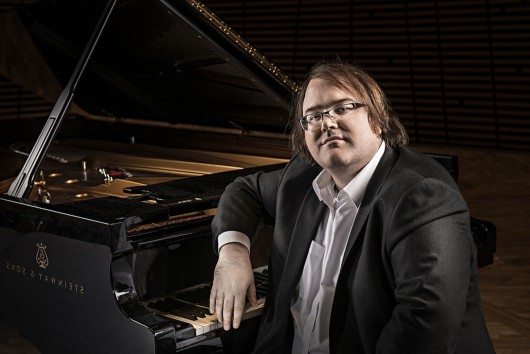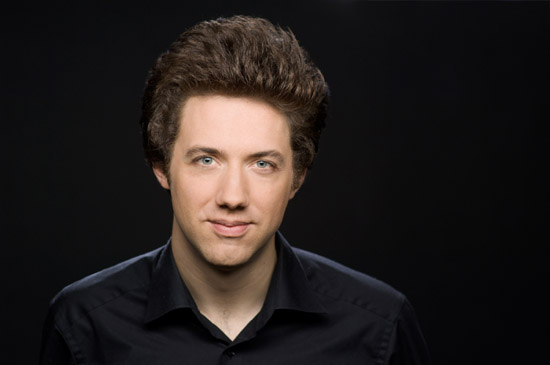Hadland / Moser Brothers, Wigmore Hall | reviews, news & interviews
Hadland / Moser Brothers, Wigmore Hall
Hadland / Moser Brothers, Wigmore Hall
Two concerts show full-toned lucidity from the Norwegian, electric charge from the German-born duo

Prokofiev milestones stood proudly at the ends of the New Year’s first three major UK concert programmes.
For the first live notes of 2016, though, it had to be Bach – it always has to be Bach – and never more of an energetic wake-up call than in the shape of the Italian Concerto. Hadland is a supreme master of lucidity, like his more easily marketed fellow Norwegian Leif Ove Andsnes. But while Andsnes offers pure spring water, Hadland likes to ride the rapids of more extreme repertoire, too. This Italian Concerto had the expected evenness of toccata attack, but it also challenged time and space like more romantic music, especially in the darker half of the Andante.
 The rest of the programme might have been subtitled “fugitive visions” – the dark as well as the light, especially in the disturbing second theme of the opening movement in Beethoven’s early Op. 2 No. 2 sonata. Here Hadland (pictured right by Kim Laland) warned us to watch out in the extreme accenting that threatens to knock the mini-juggernaut off course. The monsters threatening the gracious Rondo were terrifying, full and fat. Mendelssohn’s fugitive is the only major-key sequence of his uncharacteristically painful Variations serieuses, light in the middle of well-controlled chromatic darkness, chorale chords of such effortless dignity in Hadland’s hands that we wanted them to stay for longer.
The rest of the programme might have been subtitled “fugitive visions” – the dark as well as the light, especially in the disturbing second theme of the opening movement in Beethoven’s early Op. 2 No. 2 sonata. Here Hadland (pictured right by Kim Laland) warned us to watch out in the extreme accenting that threatens to knock the mini-juggernaut off course. The monsters threatening the gracious Rondo were terrifying, full and fat. Mendelssohn’s fugitive is the only major-key sequence of his uncharacteristically painful Variations serieuses, light in the middle of well-controlled chromatic darkness, chorale chords of such effortless dignity in Hadland’s hands that we wanted them to stay for longer.
It was the same with Brahms’s two Op. 79 Rhapsodies, where melodies of such poignancy went under in the welter of notes all too quickly. Here Hadland’s very limited use of the sustaining pedal meant that no technical difficulties could be concealed; he mastered them all with total authority and meaningful phrasing. If there was any disappointment in the entire recital, it surfaced in the less than perfect articulation of Prokofiev’s first movement; but more monsters here, in the deveopment and the second movement, were equally well tamed in the right way, while the whirling finale was unleashed but not allowed to run rampant, ending in a chord that definitely didn't seek easy applause.
It took a bit of time to adjust to the relatively reticent tone of young Benjamin Moser (pictured below) the next morning, engaging more pedal in Rachmaninov’s dense piano-writing. But then if he hadn’t held back in the composer’s G minor Sonata, his brother Johannes might not have been heard so clearly. Phrases dovetailed neatly between the two musicians, and the endings of all four movements emphasised the total synchonicity and artistry of this duo.
 If in the Rachmaninov, Johannes’s lower register could sometimes be a touch too disembodied, and his use of vibrato (a matter of personal taste) a bit too strongly applied to melodic lines that need to soar, there could be no reservations at all about the Prokofiev. This bittersweet fruit of a time – post-1948 and the terrible show trials agains “formalism in music” – when everything had to be more “melodic” shows genius speaking truth to authority in the subtlest of ways. There is absolute nobility in the opening – no problem here with the lower register which Prokofiev exploits so superbly, nor the upper one which burned like the sun – only to be followed by a wavering between sadness and fragile optimism.
If in the Rachmaninov, Johannes’s lower register could sometimes be a touch too disembodied, and his use of vibrato (a matter of personal taste) a bit too strongly applied to melodic lines that need to soar, there could be no reservations at all about the Prokofiev. This bittersweet fruit of a time – post-1948 and the terrible show trials agains “formalism in music” – when everything had to be more “melodic” shows genius speaking truth to authority in the subtlest of ways. There is absolute nobility in the opening – no problem here with the lower register which Prokofiev exploits so superbly, nor the upper one which burned like the sun – only to be followed by a wavering between sadness and fragile optimism.
The brothers missed no trick in the composer’s secret armoury before going on to have fun with the childlike outer panels of the second movement; I’ve never heard a cellist get more playful variety out of the six-note phrase endings, and his pizzicati have unique vibrancy. Then, one of the greatest and most original melodies in all Prokofiev, both forthright and poignant, very different here from its half-voice companion in the rhythmically playful finale. And C major, a very New Year key, continued in the ardent encore, a perfectly executed transcription of the central Pas de Deux from Prokofiev’s Cinderella. Any reservations in either of these Wigmore events have to completely swept aside by the sheer, extra-mile perfection of Hadland’s Mendelssohn and the Mosers’ Prokofiev. I don’t expect to hear anything better this year, though I hope there will be plenty just as good.
rating
Explore topics
Share this article
The future of Arts Journalism
You can stop theartsdesk.com closing!
We urgently need financing to survive. Our fundraising drive has thus far raised £49,000 but we need to reach £100,000 or we will be forced to close. Please contribute here: https://gofund.me/c3f6033d
And if you can forward this information to anyone who might assist, we’d be grateful.

Subscribe to theartsdesk.com
Thank you for continuing to read our work on theartsdesk.com. For unlimited access to every article in its entirety, including our archive of more than 15,000 pieces, we're asking for £5 per month or £40 per year. We feel it's a very good deal, and hope you do too.
To take a subscription now simply click here.
And if you're looking for that extra gift for a friend or family member, why not treat them to a theartsdesk.com gift subscription?
more Classical music
 BBC Proms: Royal Concertgebouw Orchestra, Mäkelä review - defiantly introverted Mahler 5 gives food for thought
Chief Conductor in Waiting has supple, nuanced chemistry with a great orchestra
BBC Proms: Royal Concertgebouw Orchestra, Mäkelä review - defiantly introverted Mahler 5 gives food for thought
Chief Conductor in Waiting has supple, nuanced chemistry with a great orchestra
 Dunedin Consort, Butt / D’Angelo, Muñoz, Edinburgh International Festival 2025 review - tedious Handel, directionless song recital
Ho-hum 'comic' cantata, and a song recital needing more than a beautiful voice
Dunedin Consort, Butt / D’Angelo, Muñoz, Edinburgh International Festival 2025 review - tedious Handel, directionless song recital
Ho-hum 'comic' cantata, and a song recital needing more than a beautiful voice
 Classical CDs: Dungeons, microtones and psychic distress
This year's big anniversary celebrated with a pair of boxes, plus clarinets, pianos and sacred music
Classical CDs: Dungeons, microtones and psychic distress
This year's big anniversary celebrated with a pair of boxes, plus clarinets, pianos and sacred music
 BBC Proms: Liu, Philharmonia, Rouvali review - fine-tuned Tchaikovsky epic
Sounds perfectly finessed in a colourful cornucopia
BBC Proms: Liu, Philharmonia, Rouvali review - fine-tuned Tchaikovsky epic
Sounds perfectly finessed in a colourful cornucopia
 BBC Proms: Suor Angelica, LSO, Pappano review - earthly passion, heavenly grief
A Sister to remember blesses Puccini's convent tragedy
BBC Proms: Suor Angelica, LSO, Pappano review - earthly passion, heavenly grief
A Sister to remember blesses Puccini's convent tragedy
 BBC Proms: A Mass of Life, BBCSO, Elder review - a subtle guide to Delius's Nietzschean masterpiece
Mark Elder held back from blasting the audience with a wall of sound
BBC Proms: A Mass of Life, BBCSO, Elder review - a subtle guide to Delius's Nietzschean masterpiece
Mark Elder held back from blasting the audience with a wall of sound
 BBC Proms: Le Concert Spirituel, Niquet review - super-sized polyphonic rarities
Monumental works don't quite make for monumental sounds in the Royal Albert Hall
BBC Proms: Le Concert Spirituel, Niquet review - super-sized polyphonic rarities
Monumental works don't quite make for monumental sounds in the Royal Albert Hall
 Frang, Romaniw, Liverman, LSO, Pappano, Edinburgh International Festival 2025 review - sunlight, salt spray, Sea Symphony
Full force of the midday sea in the Usher Hall, thanks to the best captain at the helm
Frang, Romaniw, Liverman, LSO, Pappano, Edinburgh International Festival 2025 review - sunlight, salt spray, Sea Symphony
Full force of the midday sea in the Usher Hall, thanks to the best captain at the helm
 Elschenbroich, Grynyuk / Fibonacci Quartet, Edinburgh International Festival 2025 review - mahogany Brahms and explosive Janáček
String partnerships demonstrate brilliant listening as well as first rate playing
Elschenbroich, Grynyuk / Fibonacci Quartet, Edinburgh International Festival 2025 review - mahogany Brahms and explosive Janáček
String partnerships demonstrate brilliant listening as well as first rate playing
 BBC Proms: Akhmetshina, LPO, Gardner review - liquid luxuries
First-class service on an ocean-going programme
BBC Proms: Akhmetshina, LPO, Gardner review - liquid luxuries
First-class service on an ocean-going programme
 Budapest Festival Orchestra, Iván Fischer, Edinburgh International Festival 2025 review - mania and menuets
The Hungarians bring dance music to Edinburgh, but Fischer’s pastiche falls flat
Budapest Festival Orchestra, Iván Fischer, Edinburgh International Festival 2025 review - mania and menuets
The Hungarians bring dance music to Edinburgh, but Fischer’s pastiche falls flat

Add comment